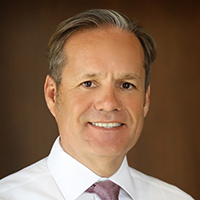HSAs Provide Stability and Solutions as Health Care Changes
Health Savings Accounts are not only good for consumers, they can help companies and maybe the health care system itself.


Profit and prosper with the best of Kiplinger's advice on investing, taxes, retirement, personal finance and much more. Delivered daily. Enter your email in the box and click Sign Me Up.
You are now subscribed
Your newsletter sign-up was successful
Want to add more newsletters?

Delivered daily
Kiplinger Today
Profit and prosper with the best of Kiplinger's advice on investing, taxes, retirement, personal finance and much more delivered daily. Smart money moves start here.

Sent five days a week
Kiplinger A Step Ahead
Get practical help to make better financial decisions in your everyday life, from spending to savings on top deals.

Delivered daily
Kiplinger Closing Bell
Get today's biggest financial and investing headlines delivered to your inbox every day the U.S. stock market is open.

Sent twice a week
Kiplinger Adviser Intel
Financial pros across the country share best practices and fresh tactics to preserve and grow your wealth.

Delivered weekly
Kiplinger Tax Tips
Trim your federal and state tax bills with practical tax-planning and tax-cutting strategies.

Sent twice a week
Kiplinger Retirement Tips
Your twice-a-week guide to planning and enjoying a financially secure and richly rewarding retirement

Sent bimonthly.
Kiplinger Adviser Angle
Insights for advisers, wealth managers and other financial professionals.

Sent twice a week
Kiplinger Investing Weekly
Your twice-a-week roundup of promising stocks, funds, companies and industries you should consider, ones you should avoid, and why.

Sent weekly for six weeks
Kiplinger Invest for Retirement
Your step-by-step six-part series on how to invest for retirement, from devising a successful strategy to exactly which investments to choose.
Thirty years ago, when I started working in the health care industry selling health insurance to business owners, that sector of the economy was booming, and all of us benefited. Across the nation, small-business owners, as a group, were growing at a breakneck speed. The Internet did not even exist until a few years later. Cellphones were a new invention. My first one was the size of a briefcase and weighed around 15 pounds, and service cost a $1 a minute.
Around 1987, a family could purchase a reasonable health insurance policy for around $300 per month with a $400-$500 deductible. That same policy would be around $1,800 per month now. On average, 80% of the bill was paid by the insurance company, while around 20% was paid by the family. Maximum out-of-pocket costs rarely exceeded $1,000. Typically, the insured would pay for doctor visits and prescriptions while insurance was left to cover major issues: cancer, heart attacks, hospitalization, serious illnesses and other concerns.
What happened next began the downfall of health care and the insurance industry as we knew it. Large health care companies approached large employers and introduced them to HMOs. Things sounded great. With a $5 co-pay, Americans went to their doctors more often, even for minor ailments. On the other side of the coin, insurance companies induced some doctors to join their plans by paying them a capitation fee of $15-$20 per month for every patient who went to them. It was a great way for doctors to build up their practices and get paid, even if they did not see patients.
From just $107.88 $24.99 for Kiplinger Personal Finance
Become a smarter, better informed investor. Subscribe from just $107.88 $24.99, plus get up to 4 Special Issues

Sign up for Kiplinger’s Free Newsletters
Profit and prosper with the best of expert advice on investing, taxes, retirement, personal finance and more - straight to your e-mail.
Profit and prosper with the best of expert advice - straight to your e-mail.
How we got in a health insurance bind
All of this sounded good, but problems quickly emerged. The low co-pays ensured patients went every time something was wrong, no matter how minor it was. As usage went up, doctors found they did not have the time to treat the patients who needed their attention for major problems. This caused some doctors to discontinue participating in HMOs because they could not treat patients at the level they wanted since they were dealing with minor ailments.
The Affordable Care Act, also known as Obamacare, made things even worse. Despite claims that it would make health care more affordable, costs for many consumers actually skyrocketed. With some in Washington now calling to reduce penalties issued for not signing up for insurance, it appears likely that the only people who will enroll under the Affordable Care Act will be the ones who face major concerns, making costs go up.
As the largest payer of health costs, including insurance premiums and doctor and hospital costs, the federal government also makes things more expensive in other ways. Increasingly, doctors and hospitals are growing tired of fighting the federal government over reimbursements, so they jack up their own prices higher than they should be, knowing they will have to discount their costs during the reimbursement process.
Let me offer an example. A woman I know suffered from an irregular heartbeat, leading to a heart monitor being used for a month, with the data sent to a hospital in another state. The provider sent a bill to her for $7,000 for these services. When the patient objected and called in to complain, the provider asked if $400 was better. Needless to say, the patient said yes and quickly paid that bill.
This is just one case in point, but not everyone is as lucky as this woman was. If you are a private payer, you might get stuck with a high bill because you don’t have insurance and you may not receive a discount.
HSAs can help consumers in several ways
With all the confusion over the future of the Affordable Care Act and health care in general, investors need to keep health savings accounts (HSAs) in mind. If you have a plan with a high deductible or an HSA-compliant health insurance plan, in 2017 you can, if you are 55 or older, put up to $4,400 for yourself or $7,750 for your family into your HSA every year to pay for doctor visits, your co-pays and other health expenses. And if two members of your family are 55 and older, together you can give up to $8,750 to your HSAs per year.
Contributions to HSAs are done on a pre-tax basis, making it a good tax tool, as it reduces your taxable income. Increasingly, large employers, including state governments, are embracing HSA-compliant health care plans, with their higher deductibles and lower premiums. Many people are opting into HSAs, especially as larger companies help contribute to them.
With more options and flexibility, HSAs can provide a boost for employers, freeing up more funds to hire new employees. Large businesses and small-business owners should at least consider looking at insurance plans that are HSA-compliant. They will find their costs will be lower across the board.
They’re also popular with investors and employees for reasons other than their tax benefits:
- Unlike flexible spending accounts (FSAs), people with HSAs do not need to spend all their funds in the account each year or risk losing them.
- You never lose your money in a traditional HSA, though an investment HSA is a different matter.
- If you continue to fund your HSA until you are 65, you can use that money to cover your Medicare supplement premiums, prescription drug costs or any medical bill you incur.
HSAs also give consumers more choices in their health care by letting them decide how that money is spent. If more Americans opt to use HSAs, health care costs should drop because more competition could lower prices. Simply put, HSAs can provide a boost to reining in health care prices and for employers. They also offer investors a nice vehicle to reduce their tax burden while helping boost their health care options.
Kevin Derby contributed to this article.
The appearances in Kiplinger were obtained through a PR program. The columnist received assistance from a public relations firm in preparing this piece for submission to Kiplinger.com. Kiplinger was not compensated in any way.
Profit and prosper with the best of Kiplinger's advice on investing, taxes, retirement, personal finance and much more. Delivered daily. Enter your email in the box and click Sign Me Up.

Derek Overstreet is an Investment Adviser who owns New Millennium Group in Utah. He believes a retirement plan should be built around safety and offer greater security for you and your loved ones. His team of financial planners provides comprehensive wealth management services designed to help you meet your investment goals.
-
 Nasdaq Leads a Rocky Risk-On Rally: Stock Market Today
Nasdaq Leads a Rocky Risk-On Rally: Stock Market TodayAnother worrying bout of late-session weakness couldn't take down the main equity indexes on Wednesday.
-
 Quiz: Do You Know How to Avoid the "Medigap Trap?"
Quiz: Do You Know How to Avoid the "Medigap Trap?"Quiz Test your basic knowledge of the "Medigap Trap" in our quick quiz.
-
 5 Top Tax-Efficient Mutual Funds for Smarter Investing
5 Top Tax-Efficient Mutual Funds for Smarter InvestingMutual funds are many things, but "tax-friendly" usually isn't one of them. These are the exceptions.
-
 Social Security Break-Even Math Is Helpful, But Don't Let It Dictate When You'll File
Social Security Break-Even Math Is Helpful, But Don't Let It Dictate When You'll FileYour Social Security break-even age tells you how long you'd need to live for delaying to pay off, but shouldn't be the sole basis for deciding when to claim.
-
 I'm an Opportunity Zone Pro: This Is How to Deliver Roth-Like Tax-Free Growth (Without Contribution Limits)
I'm an Opportunity Zone Pro: This Is How to Deliver Roth-Like Tax-Free Growth (Without Contribution Limits)Investors who combine Roth IRAs, the gold standard of tax-free savings, with qualified opportunity funds could enjoy decades of tax-free growth.
-
 One of the Most Powerful Wealth-Building Moves a Woman Can Make: A Midcareer Pivot
One of the Most Powerful Wealth-Building Moves a Woman Can Make: A Midcareer PivotIf it feels like you can't sustain what you're doing for the next 20 years, it's time for an honest look at what's draining you and what energizes you.
-
 I'm a Wealth Adviser Obsessed With Mahjong: Here Are 8 Ways It Can Teach Us How to Manage Our Money
I'm a Wealth Adviser Obsessed With Mahjong: Here Are 8 Ways It Can Teach Us How to Manage Our MoneyThis increasingly popular Chinese game can teach us not only how to help manage our money but also how important it is to connect with other people.
-
 Looking for a Financial Book That Won't Put Your Young Adult to Sleep? This One Makes 'Cents'
Looking for a Financial Book That Won't Put Your Young Adult to Sleep? This One Makes 'Cents'"Wealth Your Way" by Cosmo DeStefano offers a highly accessible guide for young adults and their parents on building wealth through simple, consistent habits.
-
 Global Uncertainty Has Investors Running Scared: This Is How Advisers Can Reassure Them
Global Uncertainty Has Investors Running Scared: This Is How Advisers Can Reassure ThemHow can advisers reassure clients nervous about their plans in an increasingly complex and rapidly changing world? This conversational framework provides the key.
-
 I'm a Real Estate Investing Pro: This Is How to Use 1031 Exchanges to Scale Up Your Real Estate Empire
I'm a Real Estate Investing Pro: This Is How to Use 1031 Exchanges to Scale Up Your Real Estate EmpireSmall rental properties can be excellent investments, but you can use 1031 exchanges to transition to commercial real estate for bigger wealth-building.
-
 Should You Jump on the Roth Conversion Bandwagon? A Financial Adviser Weighs In
Should You Jump on the Roth Conversion Bandwagon? A Financial Adviser Weighs InRoth conversions are all the rage, but what works well for one household can cause financial strain for another. This is what you should consider before moving ahead.